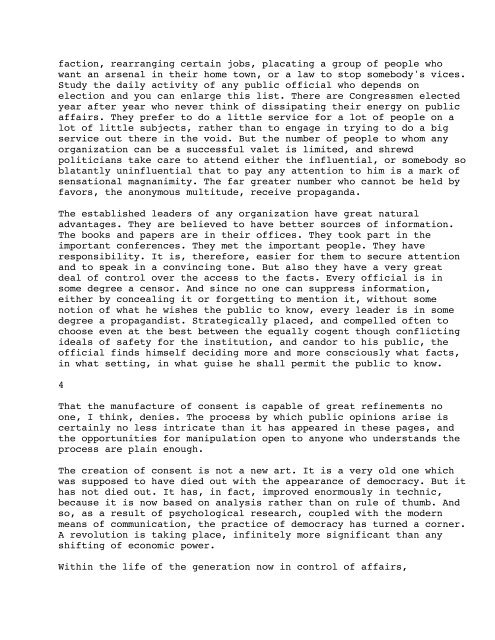PUBLIC OPINION by WALTER LIPPMANN TO FAYE LIPPMANN ...
PUBLIC OPINION by WALTER LIPPMANN TO FAYE LIPPMANN ...
PUBLIC OPINION by WALTER LIPPMANN TO FAYE LIPPMANN ...
You also want an ePaper? Increase the reach of your titles
YUMPU automatically turns print PDFs into web optimized ePapers that Google loves.
faction, rearranging certain jobs, placating a group of people who<br />
want an arsenal in their home town, or a law to stop somebody's vices.<br />
Study the daily activity of any public official who depends on<br />
election and you can enlarge this list. There are Congressmen elected<br />
year after year who never think of dissipating their energy on public<br />
affairs. They prefer to do a little service for a lot of people on a<br />
lot of little subjects, rather than to engage in trying to do a big<br />
service out there in the void. But the number of people to whom any<br />
organization can be a successful valet is limited, and shrewd<br />
politicians take care to attend either the influential, or somebody so<br />
blatantly uninfluential that to pay any attention to him is a mark of<br />
sensational magnanimity. The far greater number who cannot be held <strong>by</strong><br />
favors, the anonymous multitude, receive propaganda.<br />
The established leaders of any organization have great natural<br />
advantages. They are believed to have better sources of information.<br />
The books and papers are in their offices. They took part in the<br />
important conferences. They met the important people. They have<br />
responsibility. It is, therefore, easier for them to secure attention<br />
and to speak in a convincing tone. But also they have a very great<br />
deal of control over the access to the facts. Every official is in<br />
some degree a censor. And since no one can suppress information,<br />
either <strong>by</strong> concealing it or forgetting to mention it, without some<br />
notion of what he wishes the public to know, every leader is in some<br />
degree a propagandist. Strategically placed, and compelled often to<br />
choose even at the best between the equally cogent though conflicting<br />
ideals of safety for the institution, and candor to his public, the<br />
official finds himself deciding more and more consciously what facts,<br />
in what setting, in what guise he shall permit the public to know.<br />
4<br />
That the manufacture of consent is capable of great refinements no<br />
one, I think, denies. The process <strong>by</strong> which public opinions arise is<br />
certainly no less intricate than it has appeared in these pages, and<br />
the opportunities for manipulation open to anyone who understands the<br />
process are plain enough.<br />
The creation of consent is not a new art. It is a very old one which<br />
was supposed to have died out with the appearance of democracy. But it<br />
has not died out. It has, in fact, improved enormously in technic,<br />
because it is now based on analysis rather than on rule of thumb. And<br />
so, as a result of psychological research, coupled with the modern<br />
means of communication, the practice of democracy has turned a corner.<br />
A revolution is taking place, infinitely more significant than any<br />
shifting of economic power.<br />
Within the life of the generation now in control of affairs,





